|
|
|
Sort Order |
|
|
|
Items / Page
|
|
|
|
|
|
|
| Srl | Item |
| 1 |
ID:
189305
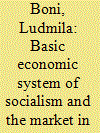

|
|
|
|
|
| Summary/Abstract |
The recognition by the Chinese academic community of the commodity economy's right to exist in a planned economy, as well as the possibility of market development under socialism, was a major breakthrough in the history of Marxism. Socialism in conjunction with the market marked the beginning of the formation of the socialist market economy system in the PRC and the development of a mixed economy. In addition, the principle of "public ownership as the basis for the joint development of economies of multiple forms of ownership" was named as the basic economic system of the country at the initial stage of socialism development. Today, it is officially called one of the most important advantages of the system of socialism with Chinese characteristics. It is this advantage, according to China, that has enabled high rates of economic growth and made the country one of the world's leading economies. But this unique feature and advantage of socialism with Chinese characteristics can be manifested and realized only within a certain coordinate system - namely, an overarching system of state administration in which the basic economic system is responsible for managing the development of the country's economy at the institutional level.
|
|
|
|
|
|
|
|
|
|
|
|
|
|
|
|
| 2 |
ID:
122822


|
|
|
|
|
| Publication |
2013.
|
| Summary/Abstract |
Two decades of aggressive neoliberalisation in Russia has failed to produce a uniform system of private property and profit-maximising enterprises. Instead, the complex interactions of multiple 'practices of property' that are pre-Soviet, Soviet and post-Soviet in origin, and not private property alone, have created a diverse economic landscape. Moreover, multiple practices of property have produced both capitalist economies (such as Moscow's early capitalist enterprises) and non-capitalist, ethically guided economies (such as the indigenous enterprises of Arctic reindeer herders). The persistence of alternative economic logics in Russia illustrates the limits of the role of private property in shaping the post-Soviet economy.
|
|
|
|
|
|
|
|
|
|
|
|
|
|
|
|
| 3 |
ID:
121094
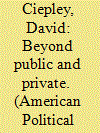

|
|
|
|
|
| Publication |
2013.
|
| Summary/Abstract |
This article challenges the liberal, contractual theory of the corporation and argues for replacing it with a political theory of the corporation. Corporations are government-like in their powers, and government grants them both their external "personhood" and their internal governing authority. They are thus not simply private. Yet they are privately organized and financed and therefore not simply public. Corporations transgress all the basic dichotomies that structure liberal treatments of law, economics, and politics: public/private, government/market, privilege/equality, and status/contract. They are "franchise governments" that cannot be satisfactorily assimilated to liberalism. The liberal effort to assimilate them, treating them as contractually constituted associations of private property owners, endows them with rights they ought not have, exacerbates their irresponsibility, and compromises their principal public benefit of generating long-term growth. Instead, corporations need to be placed in a distinct category-neither public nor private, but "corporate"-to be regulated by distinct rules and norms.
|
|
|
|
|
|
|
|
|
|
|
|
|
|
|
|
| 4 |
ID:
121049
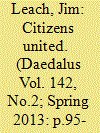

|
|
|
|
|
| Publication |
2013.
|
| Summary/Abstract |
The 2010 Citizens United ruling has been widely reviewed from the lens of legal precedent. In this critique, the author suggests the need to examine the logic and effects of the ruling from a historical, philosophical, and linguistic perspective. He challenges the Court's basis for providing inanimate entities First Amendment protection to "invest" in politics by equating corporations with individuals and money with speech. He holds that Citizens United employs parallel logic to the syllogism embedded in the most repugnant ruling the Court ever made, the 1857 Dred Scott decision. To justify slavery, the Court in Dred Scott defined a class of human beings as private property. To magnify corporate power a century-and-ahalf later, it defines a class of private property (corporations) as people. The effect is to undercut the democratic basis of American governance.
|
|
|
|
|
|
|
|
|
|
|
|
|
|
|
|
| 5 |
ID:
085894
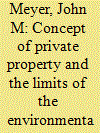

|
|
|
|
|
| Publication |
2009.
|
| Summary/Abstract |
An absolutist concept of property has the power to shape and constrain the public imagination. Libertarian theorists normatively embrace this concept. Yet its influence extends far beyond these proponents, shaping the views of an otherwise diverse array of theorists and activists. This limits the ability of environmentalists, among others, to respond coherently to challenges from property rights advocates in the U.S. I sketch an alternative concept-rooted in practice-that understands private property as necessarily embedded in social and ecological relations, rather than constrained by these relations. I argue that this concept can prefigure a more robust environmentalism.
|
|
|
|
|
|
|
|
|
|
|
|
|
|
|
|
| 6 |
ID:
152897
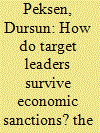

|
|
|
|
|
| Summary/Abstract |
What domestic policies do targeted regimes pursue to survive economic sanctions? Despite an abundance of research on the use and effectiveness of sanctions, scant research has been conducted on the domestic sources of the target's defiance to foreign pressure. This study explores the extent to which sanctions prompt the target regime to manipulate the domestic economic conditions through arbitrary confiscation and redistribution of private property and wealth. It is argued that economic coercion as a direct threat to political survival and coercive capacity of the target government creates incentives for politically insecure elites to engage in the policy of predation to counter the negative economic effects of the coercion on themselves and their constituency. Using time-series cross-national data from 1960 to 2005, the results indicate that as sanctions exact significant economic damage on the economy, the target government is more likely to pursue predatory policies. Further, the suggested impact of sanctions on property rights abuses does not appear to be conditioned by political regime type of the target and the involvement of the United States or multiple countries in the imposition of sanctions. Focusing on the government use of predatory policies to evade foreign pressure, this study expands the current understanding of sanction ineffectiveness in pressuring the government to acquiesce to external demands. It also shows that one major inadvertent consequence of sanctions is the deterioration of the economic security and private property rights of citizens in target countries.
|
|
|
|
|
|
|
|
|
|
|
|
|
|
|
|
| 7 |
ID:
114986
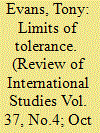

|
|
|
|
|
| Publication |
2011.
|
| Summary/Abstract |
Following recent acts of terrorism in many parts of the world, Islam has become an object of fear. While the threat of violence is undoubtedly an element that inspires this fear, Islam's counter-hegemonic threat is not limited to violence alone. Given its 1.2 billion following, Islam also offers a challenge to the central values that describe the dominant neo-liberal world order, particularly those values that legitimate the global political economy. Although tolerance is an important value in liberal thought, tolerance cannot be exercised where counter-hegemonic threats include challenges to the central tenets of liberalism. This article argues that the current fear of Islam is motivated by just such a challenge. By looking at four central concepts where liberal and Islamic thought diverge - reason and revelation, private property, rights and duties, and government and state - this article seeks to gain a more nuanced insight into current attitudes towards Islam and the fear of counter-hegemony.
|
|
|
|
|
|
|
|
|
|
|
|
|
|
|
|
| 8 |
ID:
107314


|
|
|
|
|
| Publication |
2011.
|
| Summary/Abstract |
This article analyzes the results from of 11th Congress of the Communist Party of Vietnam, held in January 2011. The resolutions of the congress, along with the directives of the 2011-2015 Five-Year Plan for the Development of the Nation, open a new period of political renewal already referred to as doi moi 2.
|
|
|
|
|
|
|
|
|
|
|
|
|
|
|
|
|
|
|
|
|